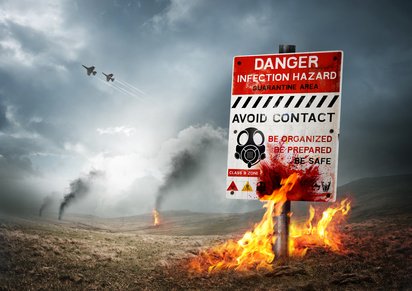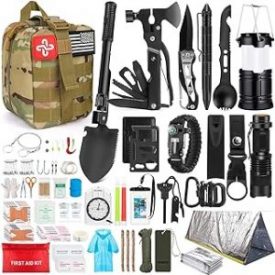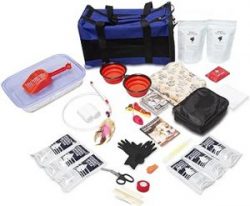How To Survive A War
A war is possibly the last thing anybody would want to live to experience. The world has already been a witness to several world wars. As students of history, we have studied different wars and how the people during those times have lived. War times are definitely not good times.
Recently, different parts in the world have gone to war. We see different war footages on television and notice how the number of casualties exponentially grows. Although almost everybody realizes that there are no true victors in most wars, we can’t seem to totally eliminate the prospect of having to go to war.
Somebody famous once said, if we want peace, we have to prepare for war. But as mere civilians, we don’t have that much power to largely make a difference during war times. The most we could probably do is to prepare ourselves, if in case war breaks out suddenly.
Just like in preparing for natural calamities, we need to quietly stock as much food and water as possible prior so as not to be labeled a horder. Equally important are readying pieces of protective cloth that we could use to cover our mouth and nose, and sunglasses or goggles for our eyes as protection against dust particles brought about by bombings and the like.
On a larger scale, the government planning to involve itself in a war should have prepared emergency underground facilities. These facilities would contain grain silos and medical stockpiles. Civilians and injured soldiers are usually housed in one of these underground facilities.
Large cities often have several underground centers that they could use during war emergency situations. City buildings have deep basements in solid rock, during war these basements can be connected by passageways allowing considerable movement about totally underground. Examples of these are the underground tunnel facilities near major railroads.
Aside from guns and ammunition, the government should also equip themselves with war machineries such as truck transportable bridges, mobile refineries, mobile decontamination services, and water purification systems. Other amenities such as petroleum supply are especially reserved for times of war.
Of course, the government will have to organize effective cooperation between its different civil services. The police, healthcare service, fire service and other public utility providers are expected to work together to ensure that civilians get as much protection as possible. Sometimes, able bodies might be requested to undergo special training programs to help protect the rest of the civilians.
War is such a large scale event that as individuals and small communities, we could only do so much. Most of the preparations involved are left to the national government and international security institutions. As citizens, we will be left with no choice but to follow where the government leads us in times of war. Collective effort is very important for survival.
Probably the most effective way of preparing for war is to disseminate accurate information effectively and rapidly. Information on self-protection should be disseminated to the public. Concerned international authorities will also be able to benefit from information sharing. A large pool of information resources will be helpful for both parties, and would allow them to hopefully come into an agreement even before war could eventually break out.
Because of high technology, which greatly affects how the world goes to war, preparing for war is getting more and more complicated. We already have nuclear, chemical and biological weapons which can wipe out a continent within a few minutes. High walled castles and forts made of stone and concrete which used to protect early civilizations from war are not enough anymore with the severity of the damage which these weapons can cause.
During the height of the cold war, the government made various programs to prepare its citizens for a nuclear holocaust. This included making bomb shelters hundreds of feet below the ground as well as teaching children to duck and cover usually under the school desks in the event of an attack.
In 1989, the Cold War ended and this is no longer considered as a threat. Unfortunately, the world is facing a new enemy. It is no longer a world that has a vast armies capable of invading another nation capable of protecting itself. This foe is now fighting a guerilla war by conducting terrorist attacks both here and abroad.
There has not been a major strike on US soil since 2001. The intelligence communities of various nations have foiled such attempts even though there have been attempts such as the plan to bomb transatlantic from the UK.
Can anything be done to prepare for the next world war? Preventing the next biggest conflict is difficult but not impossible. Thermonuclear is just one way an attack will be carried out but the use of chemical and biological weapons is a bigger threat. How To Survive Nuclear War a small pdf download.
Many people may perish but following some tips for war emergency preparation may ensure the person’s survival.
1. People go to the supermarket each week to replenish the food that was consumed. It wouldn’t hurt to buy extra canned goods every so often because it will not spoil until it is opened. Simply rotate your food stores so things stay fresh within their expiration dates.
2. Aside from food, having an amply supply of drinkable water will prevent dehydration. Plastic jugs can be purchased from the supermarket and empties saved but if it is unsafe to go out, the people will have to get water from the faucet. It will be a good idea to add a purification tablet and boil this first to make sure it is safe to drink.
3. Having a first aid kit is always useful to treat wounds. The individual should check that it is complete at all times because no one can tell when this will be needed.
4. If people have to evacuate, it will be a good idea to bring food, water, a few extra clothes, flashlight, compass, matches, candy and an identification card. Everything should be packed in a backpack so everyone can move quickly to the nearest evacuation center.
5. The last tip for war emergency preparation is to be familiar with the disaster plans that have been distributed by the national government and city. Some regions already have contingency plans in place. If this plan has been announced in the Internet and on television and if this should happen, people should stay calm and slowly evacuate.
The tips mentioned are not only useful in the event of war but also when faced with a hurricane, an earthquake or any other natural calamity. This is because people who want to live through the crisis will do anything to see another day.
There has not been a major conflict in over sixty years but it does not mean that people are safe. There are elements in the world that want to do harm and people have to be prepared for it.
_


 January 11, 2017
January 11, 2017 







